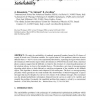Free Online Productivity Tools
i2Speak
i2Symbol
i2OCR
iTex2Img
iWeb2Print
iWeb2Shot
i2Type
iPdf2Split
iPdf2Merge
i2Bopomofo
i2Arabic
i2Style
i2Image
i2PDF
iLatex2Rtf
Sci2ools
118
click to vote
CORR
2002
Springer
2002
Springer
Survey propagation: an algorithm for satisfiability
: We study the satisfiability of randomly generated formulas formed by M clauses of exactly K literals over N Boolean variables. For a given value of N the problem is known to be most difficult when = M/N is close to the experimental threshold c separating the region where almost all formulas are SAT from the region where all formulas are UNSAT. Recent results from a statistical physics analysis suggest that the difficulty is related to the existence of a clustering phenomenon of the solutions when is close to (but smaller than) c. We introduce a new type of message passing algorithm which allows to find efficiently a satisfying assignment of the variables in this difficult region. This algorithm is iterative and composed of two main parts. The first is a message-passing procedure which generalizes the usual methods like Sum-Product or Belief Propagation: It passes messages that may be thought of as surveys over clusters of the ordinary messages. The second part uses the detailed pro...
Related Content
| Added | 18 Dec 2010 |
| Updated | 18 Dec 2010 |
| Type | Journal |
| Year | 2002 |
| Where | CORR |
| Authors | Alfredo Braunstein, Marc Mézard, Riccardo Zecchina |
Comments (0)

